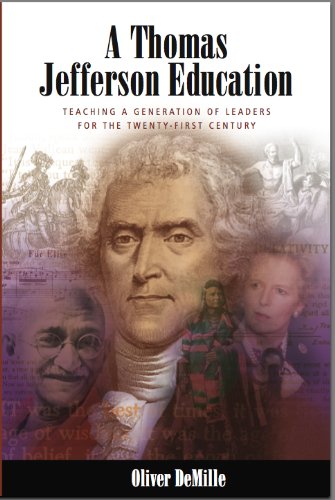 I was recently urged by an adoptive mama friend and fellow homeschooler to read Oliver DeMille’s A Thomas Jefferson Education: Teaching a Generation of Leaders for the Twenty-First Century. It’s been on my wish list for quite some time, so it seemed like a perfect time to review it. It was a fairly quick read for me, though I think that’s partly because I found the material so fascinating. I’ll share a general overview:
I was recently urged by an adoptive mama friend and fellow homeschooler to read Oliver DeMille’s A Thomas Jefferson Education: Teaching a Generation of Leaders for the Twenty-First Century. It’s been on my wish list for quite some time, so it seemed like a perfect time to review it. It was a fairly quick read for me, though I think that’s partly because I found the material so fascinating. I’ll share a general overview:
The goal of a Thomas Jefferson education is to inspire greatness by training leaders how to think. A unique, personalized education designed to meet the specific needs of each student is employed. The core foundation of this education philosophy is fairly simple – inspire greatness through the classics and great mentors. The mentor must be “someone of high moral character who is more advanced than the student and can guide his or her learning.” (pg.39) Classic books, the ones that have stood the test of time, not textbooks, are used to prepare children to think and lead. Discussion of the books teach ideas of greatness and lessons of humanity that can then be applied to the student and society through questioning, probing, pondering and writing. It’s incredibly simple, yet powerful.
DeMille is also very clear that the student himself is responsible for his education, not the teacher. The teacher (or mentor) has only the job to inspire, not to educate. A passion for education in the mentor, he claims, is contagious. The student must be the primary educator because he will only learn when he chooses to learn. DeMille suggests a simple “Three Rs” curriculum that is coached by the mentor using classics to “read, write, and discuss.” There is a philosophy of “great work” or “do it again,” with no mediocre or unsatisfactory work being accepted. The general theme is that the teacher guides, while the student educates.
I really enjoyed comparing DeMille’s “TJEd” model to the classical education model that we employ almost exclusively in our homeschool studies. Though I didn’t agree with some of his points, I found similarities to my personal education philosophy. I would not follow every idea in this book, but I do think it offers a lot of merit. DeMille inspired me to consider organizing a great books discussion group for older children, so I’m processing through what that might look like in the future. Some of my favorite memories from high school were our small group discussions of The Great Gatsby, Tess of the D’Urbervilles, A Separate Peace, Catcher in the Rye, The Sound and the Fury, A Farewell to Arms, Heart of Darkness, and I could keep going on. I did not receive a classical education, but my private school offered a very strong “great books” education. My love for the classics has stuck with me, which is probably one reason I feel so confident in the classical model.
I would certainly recommend this resource to all homeschool parents or anyone interested in education. Oliver DeMille offers an intriguing argument for his leadership education philosophy, and I think most everyone could take away at least a few ideas.






